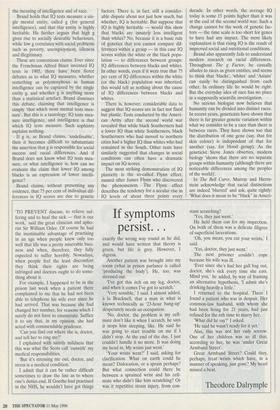If symptoms
persist. . .
`TO PREVENT disease, to relieve suf- fering and to heal the sick — that is our work,' said the great clinician and apho- rist Sir William Oster. Of course he had the inestimable advantage of practising in an age when people knew only too well that life was a pretty miserable busi- ness and when, therefore, they fully expected to suffer horribly. Nowadays, when people feel the least discomfort they think their rights are being infringed and doctors ought to do some- thing about it.
For example, I happened to be in the prison last week when a patient there complained to me that he had not been able to telephone his wife ever since he had arrived. That was because she had changed her number, for reasons which I surely do not have to enumerate. Suffice it to say that, in my opinion, she had acted with commendable prudence.
`Can you find out where she is, doctor, and tell her to ring me?'
I explained with saintly mildness that this was what the Scots call 'outwith' my medical responsibilities.
`But it's stressing me out, doctor, and stress is a medical condition.'
I admit that it can be rather difficult sometimes to draw the line as to where one's duties end. If Goethe had practised in the NHS, he wouldn't have got things exactly the wrong way round as he did, and would have written that theory is green, but life is grey. However, I digress.
Another patient was brought into my room (what in prison parlance is called `producing the body'). He, too, was stressed out.
`I've got this itch on my leg, doctor, and when it comes I've got to scratch.'
`Very sensible,' I said. I almost added, a la Bracknell, that a man in what is known technically as '23-hour bang-up' desperately needs an occupation.
`No, doctor, the problem is my cell- mate don't like it when I scratch, he says it stops him sleeping, like. He said he was going to start trouble on me if I didn't stop. At the end of the day, I just couldn't handle it no more. It was doing my head in. My wrists just went.'
`Your wrists went?' I said, asking for clarification. What on earth could he mean? Dislocation, or a sprain perhaps? But what connection could there be between a sprained wrist and his cell- mate who didn't like him scratching? Or was it repetitive strain injury, from con- stant scratching?
`Yes, they just went.'
He held them out for my inspection. On both of them was a delicate filigree of superficial lacerations.
`Oh, you mean, you cut your wrists,' I said.
`Yes, doctor, they just went.'
The next prisoner couldn't cope because his wife was ill.
`Ever since she's had her gall bag out, doctor, she's sick every time she eats. Mind you,' he added, by way of framing an alternative hypothesis, 'I admit she's drinking heavily a little.'
I returned to the hospital. There I found a patient who was in despair. Her common-law husband, with whom she had been living for 21 years, had just refused for the nth time to marry her.
`What did he say?' I asked.
`He said he wasn't ready for it yet.'
Alas, this was not her only sorrow. One of her children was so ill that, according to her, he was 'under Great Armband Street'.
Great Armband Street? Could they, perhaps, treat wrists which have, in a manner of speaking, just gone? My heart missed a beat.
Theodore Dalrymple


































































 Previous page
Previous page